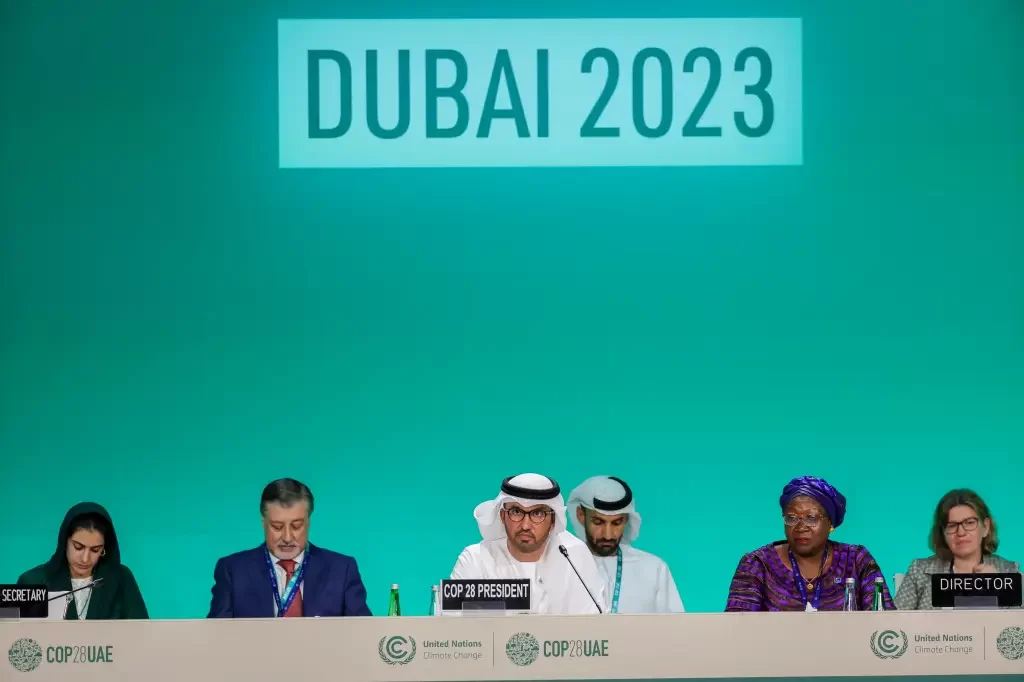Published on 12/08/2023 at 17:17
COP28 could, in the words of Emirati summit chair Sultan Al Jaber, be “the game-changing conference,” and the powerful oil cartel, with 13 members and dozens of allies, seems to understand this. He considered it a risk.
The Secretary-General of the Organization of the Petroleum Exporting Countries (OPEC), Haitham Al-Ghais, warned in a letter sent to member states that “unjustified and disproportionate pressure on fossil fuels could reach the point of no return with irreversible consequences.”
Al-Ghais stressed in his letter sent on Wednesday that “the draft resolution still includes options for phasing out fossil fuels.”
COP28 has been assessing the balance of the fight against climate change since 2015, when the Paris Agreement was signed. The treaty set the goal of limiting global warming to 2 degrees Celsius, and as much as possible to 1.5 degrees Celsius, compared to pre-industrial levels.
Climate scientists agree that the world must abandon fossil fuels as quickly as possible if it is to reduce greenhouse gas emissions to limit global warming.
A new draft of the 27-page COP28 Final Declaration was published throughout the day, with several options on what to do with oil, gas and coal.
“Abandoning” or “reducing” the use of these energy sources is the dilemma of the final announcement that ministers are expected to present next Tuesday (12).
There is also a third controversial option, which is not to mention fossil fuels at all.
“This latest draft shows that we are nowhere close to abandoning fossil fuels,” explained Roman Eulaline of Oil Change International. “But how this transition occurs will be an uphill battle in the coming days.”
Fossil fuels have played a crucial role in the development of rich countries and also in concentrating carbon dioxide in the atmosphere, accelerating the warming of the planet.
Currently, many developing countries, which possess large hydrocarbon reserves, view their disposal with concern.
OPEC’s letter said that “although member states” and its partners “take climate change seriously (…) it would be unacceptable if politically motivated campaigns endanger the prosperity and future of our people.”
Finish the work
Decisions must be adopted by consensus at the United Nations Conferences of the Parties.
Andreas Sieber, of the NGO 350.org, warned that “all eyes are on the presidency.”
Jaber distributed the tasks until Tuesday to four working groups, co-chaired by two ministers from the countries, which will receive suggestions from the participants.
China and the United States are entering the game
In Dubai, relations between the United States and China dominate a large part of the negotiating environment. The European Union shows an ambitious position on most issues.
Authorities from China and the United States met last month and agreed that “it is necessary to accelerate the implementation of renewable energy to accelerate the replacement of electricity production from coal, oil and gas.”
This means that the COP28 declaration could link the fate of fossil fuels to increased energy production from renewable sources.
This will include tripling the installed capacity of renewable energy by 2030, as well as doubling the efficiency of energy use.
Al Jaber declared: “We have to be fair. We have to be fair. We have to be organized and responsible in the energy transition.”
One of the goals of the 2015 Paris Agreement is to achieve greenhouse gas emissions neutrality by 2050.

“Wannabe internet buff. Future teen idol. Hardcore zombie guru. Gamer. Avid creator. Entrepreneur. Bacon ninja.”

